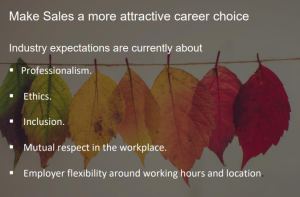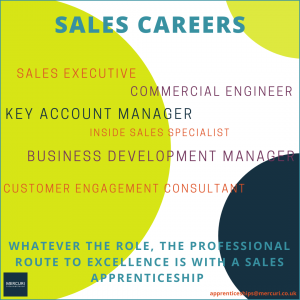Barry Hilton hosted our second webinar on Women in Sales. We were delighted that once again Lynn, Chaninah, Julie, and Hannah, whose opinions and experiences created such an energetic reaction on the first webinar, joined as panellists and female role models.

Attracting, retaining and developing women into sales roles
Today we want to build on the topic and explore three key areas and that is attracting women into sales roles, retaining talent within the industry, and creating a leadership demographic, which is more representative of society, is inclusive, ensures right person-right job, which is really important, and optimizes the commercial opportunities for employers. The panel will explore issues that can encourage or discourage engagement, raise or lower retention rates, and improve or impede career development.
Previously we referenced a Harvard Business Review article. Now we’re going to reference some data from a Gartner report from 2020, which provide an appropriate frame for this discussion:
“Although women make up just over half of the college-educated workforce, they hold less than one-third of B2B sales jobs.”
Harvard Business Review
“An overwhelming 66% of women believe their sales organizations struggle to retain high-performing female sales professionals.”
Gartner Report
Sales – an attractive career choice for women
When we look at that first issue of making sales a more attractive career choice, industry expectations are currently about the following:

The gender balance trend with regards to women in sales was already moving in the positive direction, but COVID-19 and the lockdowns that we’ve been through has actually combined to create an opportunity. Rather than stifle opportunity, it’s actually creating it, it’s almost an accelerant to the process.
These days, I think the lone wolf sales hunter is pretty much being supplanted by collegiate team-focused approaches based on cooperation and mutual support. Last time, we explored how these were very well suited to women in sales.
Now, employer flexibility has actually been rewarded during COVID by higher productivity and motivation. It’s not been abused by lazy workers. I think that myth has been blown out of the water. An added dimension facing many employers currently is recruitment. There are just not enough good candidates for jobs. You’re maybe experiencing this within your own company environment, talent and general is not being attracted into our industry. The number of no-shows now for interviews is increasing really on a weekly basis.
Retaining sales talent

If we look at retaining talent, a significant majority- again, this 66% quoted by Gartner- of women believe that their organization struggle to retain high-performing female sales professionals. This concern is shared by 56% of men in sales who were asked the question. We can’t say that it’s by 56% of men in sales, that’s a ridiculous extrapolation, but certainly, the sample set suggested that a majority also thought that. 39% of women believe they don’t have the same opportunities for advancement as male counterparts with the same skills and qualifications. The perceived lack of opportunity for women makes it especially difficult to retain high performers.
To effectively improve gender diversity in sales organizations, key questions must be asked. I’m just going to highlight some of those right now.
- Processes being in place to ensure women have equal access to the rewards and development.
- People’s behaviours within the workplace in the sales environment. Are they inclusive? It’s also about why. What lessons are we learning from women who do leave sales and what would attract them potentially back into the profession?
- What are the processes that underpin this? Are organizations actually evaluating how people are promoted or selected for succession and what their inclusion processes are? These are really, really important points for companies to consider.
The inclusion problem
If we think about moving up within the organization, how is that possible? Now, Gartner call this the “inclusion” problem. In their 2020 report, How to Close the Gender Gap in Sales, they said
“Low retention levels of high-performing female talent, particularly in leadership ranks, are one of the biggest indicators of the inclusion problem in sales.”
Gartner Report, How to Close the Gender Gap in Sales
What can organizations do to nurture female sales talent?
How should this be tackled and how is it being tackled, and is there a difference between these two things right now? This also provokes the question that if you’re not going to create that through leadership opportunities, what else can you do to nurture female talent within sales?
We’ve got a few questions that we want to pose to the panel. The first one is this, role models are often cited as crucial, especially to young people. What can employers do to support role modeling of women in sales? I’d like to offer that first question to Chaninah, please.
Hi, Barry. For myself on that, I think the APS are doing some fantastic work with the webinar series that we’re doing. Hopefully, this is going to be the second of many. I’m looking forward to part three already, in regards organizations generally I think they need to put more women at the forefront.
“In interview processes, ensure women interview staff throughout that journey so they can see these positions of power that are actually being filled by women and they’ve got the role models available for them there. I think that would have huge benefits.”
Chaninah Dzialoszynski, BSI
Defined career path
We also need defined career paths. Nobody wants to just move into sales and feel like it’s just a sales role. They need to see the progression and especially as a woman, you want to see that you’ve got your career path available for you.
You’re actually talking there from personal experience, if you don’t mind me referencing that? Because you’ve had that opportunity now to move up within your organization. I think one of the points that came out of our discussion that we had earlier, and I’d like to hear the rest of the panel’s view on this. Very often, women will not put themselves forward for an opportunity until they feel they’re almost exactly ready, whereas perhaps male counterparts, will pretty much jump at anything. I’m being slightly provocative there. Would you agree to an extent with that?
Yes, definitely. For myself, we’re very self-aware and we’re very critical of ourselves and you don’t feel that you’re quite ready for the next step until you’re almost performing that role already.
Role models
Maybe if we could just come over to you, Julie, on that particular topic then about role modeling and readiness for the next step as well.
It’s really important, echoing what Chaninah said, to get female role models in front of people early. Start with education, taking successful female role models into schools, especially within sales and talking about sales and around STEM and letting them see that there’s other women that are doing it and are really successful
“It’s about making it open to everybody because it can still be quite male-dominated. If we’ve got strong women going out to the schools and they’re the ones promoting this and talking about it as a career path, I think that’s a great starting point.”
Julie Nicholson, CCS Media
Awareness in schools
There’s a general lack of awareness in schools about sales, but particularly probably amongst female school leavers. Would you agree with that?

Yes, definitely. We’ve been talking to some of the career leaders within different schools and when they’re talking about different roles, sales hardly ever came up with the girls, it was something they didn’t actually think about. Like you say as well, at the moment, with regards to recruitment, there’s not so many people showing up, is it because we’re not promoting it enough as well and giving them the opportunity to make them aware of what’s available? I think a key element, is definitely getting in there early with the schools and letting them know and speaking to their careers advisors and the colleges. That’s got to be the first start for us, I think.
Excellent. Hannah, your view on this?
For me personally, just to follow on Julie’s point, having senior leaders in an organization makes it really accessible for role models. Spreading awareness through schools and universities as well also helps. We do internally, at HPE, quite a few different things:
- Mentoring schemes
- Sales schools and sales academies that help bring people through the organization and nurture new people coming in. I think that makes it more accessible for women to join an industry when you’re spreading awareness.
If I can just refer to something that you and I talked about before, which was you’re quite actively involved in some initiatives and activities to encourage the discussion about women in sales. You mentioned the fact that one of the KPIs that you were trying to monitor was how much there was an attendance and a participation from men in those discussions. We saw that that figure was quite disappointing. That’s an inclusivity point, obviously from the inclusion of men in the discussion, why do you think they’re not attracted to those kind of discussions?
Building confidence for women
Historically women’s sessions have been maybe moaning about things rather than proactivity. I lead our Women at HP in London, and as part of that, one of the key pillars is to build confidence for women in the workplace, but also to encourage men to champion that conversation as well. If we have men on the table, it’s not about slating men.
“It’s about making sure that we’re ultimately all coming together to make our workplace better and spread awareness and build confidence for men and women.”
Hannah Saddington, HPE
As part of that, STEM falls into it. We’re getting men and women to go into schools, universities, and just champion IT in general in sales. If we have men as part of the conversation, they’re the majority of our workforce, so we’re more likely to see change.
Thanks for that, Hannah. It’s a very interesting and somewhat controversial point that polarizes discussion, but I think it shouldn’t. Sometimes the reactions from people to it, we saw that with some of the questions and comments that came back after the last webinar, were somewhat defensive. From males, as if the whole subject of women in sales was in some way, some kind of beat-up session when in fact it was completely the opposite.
Lynn, if I could come to you on the role models issue, you having been a role model– Being a role model within your own organization, and one of the first, I think you told us, females, in that engineering role, and then in the sales role, your view on role modeling?
Well, for me, I’ve got a slightly different background. As you’ve just said, I’ve come in from a technical stance. I started really from a STEM aspect and then moved into sales. I’m a combination of the two. For me, my whole career started from a role model during school. I’ve been “unusual” shall I say, the whole way through my career.
What’s exciting about your job?

It all came back to one day at school, an assembly was led by a woman who came in from BT. She made the idea of appearing in a van with a hard hat and her safety boots and jumping up and down telegraph poles exciting. That was it for me, the one spark that set it off for me. “I want to be an engineer.” Even though I don’t work for BT and have never been up a telegraph pole!
The femal role model does work. In Rockwell the EMEA president is a woman. That’s made a massive difference. In the last few years, we’ve now got loads of organizations globally, women in sales, women engineers, women in the field, The Women’s Council. We do encourage men to be involved. As you say, there aren’t that many of them, but the men that do come always say that they feel enlightened by the end of it.
The problem about female role models, from my experience, is there’s no point rolling out people who are just the CEO of, or the head of sales, and say, “Look how great I am.” It’s got to be relevant to the audience, they need to be able to visualize themselves in that tole. I visualized myself being an engineer and stuck to my guns irrespective. It’s the same with the TED talks and that kind of thing, where you see lots of fantastic men and women who are the executives for companies and they’ve written a book. The majority of us aren’t Harvard-educated.
“We’re just normal people and we want to be able to see normal people getting into roles that we would like to move to ourselves.”
Lynn Siggins, Rockwell Automation
Visualisation, relevance and credibility
You have to be able to visualize where you’re going and it has to be relevant, I think. The femal role model has to show how they got there not just stand there and say, “Look how great I am and look what I do.” They’ve got to be able to explain the A, Bs, and Cs. Now, in my world, it’s mainly men. How do we make those men role models for women? The best way to do it is, if you can’t find a woman who’s a role model, find a man who’s a role model, and make him show the women, maybe, the softer side of his job because that’s possibly the biggest element that stops us going upwards in the world, we worry about our childcare, we’re worried about who’s going to do the shopping, — we have so many things going on in our heads. It’s cultural.
Understanding how an executive runs his life and the fact that it isn’t that much fun to be traveling around the world and missing his kids all the time, understanding that softer side of some of the real high powered guys, that had much more effect on me than seeing someone who just became an engineer because, or became a salesperson because. There’s a theme developing here, which is about connection. If you want a role model, there’s got to be a connection between the role model and the people that they’re role modeling to. I think that a really good point that you made was that it doesn’t necessarily have to be a female role model for a female to get into a sales role. There has to be a connection and a credibility.
Cultural impact
Chaninah, you mentioned to me in a previous discussion that there’s recently been a senior female appointment in your organization, and that had made somewhat of a cultural impact, but not in a big splash way. It was just a gentle cultural shift perhaps. I’m trying not to put words into your mouth, I was intrigued by the way you described it.
It’s very true. Actually, when I sat back and I thought about it, we’re incredibly privileged at BSI. We have a female CEO, our head of internal sales is female, we have one sales manager that’s female, and then three team leaders that are female. That’s just in the sales department that I work in. There are huge numbers of influences and role models available for me, where I can see the career progression, and I can also see different ways for connecting with all of them, strengths in everybody. Like Lynn said, that doesn’t mean that I don’t see the same throughout the male role models and the male managers as well. I can just relate a little bit more to the female ones
It’s really important to emphasize here as well, that what we’re not trying to do is completely rewrite the world or change the world, but we’re trying to get some sense of balance and what– when the needle shifts a little bit, then the culture sometimes shifts. Things that are not working particularly well in organizations have a chance to change and reset. It’s part of the discussion. I don’t think people should be defensive about that. It’s a great way to get us onto the next question. I’m going to pose that to you, Julie.
Why sales?
What attracted you to the role of sales in the first place, and more importantly, perhaps what’s kept you into this? I’m sure you won’t mind me saying to everyone publicly that you said that you completely love your job just before this webinar started and you were loving it. That enthusiasm was really infectious, even in the warm-up that we were doing. Why? What is it that’s driving that?

I’m probably one of the old-school salespeople that fell into it. It wasn’t a choice, it was something that came up, went for a few interviews, and I loved the idea that the harder I worked, the more I could earn. Literally, that’s why I took the job. When I got into the job, it was a bit like, “Wow, this is full-on. This is pretty tough. It’s not as easy as I thought it was going to be.”
Fantastic management
I had a strong team, I was lucky that I was supported and had a fantastic manager when I first started out. They held my hand the whole way through it for the first six months. Finding out I was getting paid to talk to people was fantastic. It was amazing, I was getting paid to talk and I was earning money for it. I thought it was exactly what I wanted to do.
During that time, I developed techniques and skills and found that I was quite fortunate that I was quite good at it. At CCS Media I’ve been really, really fortunate. As an organization, I think we’ve bucked the trend. We are quite strong in females, over 50% of our management team are female within CCS. Also, the male role models that we have are so supportive. Literally, you get full backing whether they’re male or female at CCS, you feel totally supported. We are very fortunate.
“I absolutely love my job. I get paid to talk!”
Julie Nicholson, CCS Media
Working in the academy is inspiring because everything that I’ve learnt during my career, I can now impart to everybody else. Seeing other women coming up the ranks as wel is fantastic– I’m a big advocate of women in sales and they are doing amazingly well through all the empowerment that we can give to them.
Probably, you could say that when the balance is right, that the issue of gender just goes away, doesn’t it? Because people are not defining you by gender, it’s just as a team and the team works in a harmonious way. It’s not saying that you don’t have problems in a business, every business does, but it’s getting the balance right. That’s excellent.
Lynn, your view of– Well, we know how you got into Sales because you’ve told us about that before, but what’s kept you in sales? What’s kept you in, against the odds, if you like.
Sales development and the Level 4 Sales Exec
I’m laughing here at the, “We get paid to talk.” As you might have noticed I’m pretty chatty. I’m really gregarious, so sales is perfect for someone like me. I’m now in my second apprenticeship doing my Sales Level 4 Apprenticeship. For me, it was, “Do you want to be a techie?” in the true sense of the word. I’ve spent most of my apprenticeship being told to be quiet. Being offered a job in sales was a fantastic option.

“What’s not to like? You get to wear your suit, you get to drive your car around, you control your own destiny, you get to travel. In my case, one day to the next, I can see how a KitKat is made one day and a Jaguar Land Rover the next. I get paid well to do what I like and what probably suits my personality as well. If you’re good at communicating and you like communicating, then sales is the thing. What’s not to like?”
Lynn Siggins, Rockwell Automation
You both put yourselves in the position of being female role models that need to now go out and tell all the other female school leavers, “This is why you should do it, you get how to see how a KitKat’s made, you get to see how a Land Rover’s made and you get to talk. Fantastic. You get paid for it.”
That’s what we do with the STEM. When my company goes out and we do the STEM stuff, we literally show the kids the videos of how a KitKat is made.
So you’re making it real, fantastic, Lynn. Thanks for that.
Staying in sales
Hannah, what about you? Probably more important to talk about what’s kept you in the role, I think.
In my company specifically, what’s kept me in the role is just the support I’ve had, if I’m honest. Support from all areas of our organization and sponsors that are both male and female. I think that’s made it really apparent that I can progress through our organization, specifically around sales. The other reason why I’ve not moved out of sales is because I’m good at it.
“I like solving problems for customers. When they come to me with a problem and I can provide a solution for that, it makes an impact not only on our company revenue, but it also makes an impact in what they do as well. For me, opportunities are endless and you can just build relationships with customers.”
Hannah Saddington, HPE

The point of money has only come up once and it wasn’t emphasized, but it’s all sorts of other things that make the job satisfying. Chaninah, again, your career has moved in a fairly dynamic positive direction over the last year or so, what about you? What’s keeping you in sales?
I love to be able to solve a problem for a client, but it’s the fact that it’s not transactional. You build a relationship with them and you look at that longer-term picture with the client and you go through a journey with them. That part of it is what’s kept me in sales, seeing where a client begins and then seeing where they end up at the end. Again, like Hannah said, I’m good at it. It just comes naturally.
Chaninah Dzialoszynski, BSI
Enthusiasm and passion
The enthusiasm is infectious and it’s very natural listening to you all talking. It also links, because of your success, the success that you’ve all had in your careers, it links to the next point. I just want to refer back to something that Hannah said about being good at sales.
“One of the mistakes I think that organizations make in the sales world, is they promote successful salespeople into leadership roles because of ambition of the candidate rather than a suitability for the job.”
Barry Hilton, Mercuri International
Now, that kind of is a little bit of a tension in a dynamic sense with giving females more opportunities to move up the tree because if you’re good at what you’re doing, why would you move out of it? Then again, we also want to make sure that we try and ensure the balance is right within the organization at leadership level.
Question, first of all, to you, Hannah, we’ll stay with you on this one, what processes are in place to ensure that women have equal access to rewards and resources and advancement within your organization?

I don’t think we actually have any processes in place as such that are specifically aimed at women. My role in sales is all based on my performance and that’s not specific to gender. In terms of having open access to achievements and resources, we’ve got HR that do work on training all managers on inclusive leadership and making sure that they review all submissions managers make on bonuses across the different gender and age groups as well. That’s based on levels, not on gender as such. We don’t have processes in place, but for sales anyway, it’s based on performance. From my own perspective, I think I’ve got equal access to any training that I need not because I’m a woman.
Well, that’s really encouraging to hear actually. Based on what Julie has also said and Chaninah has said, there is very strong female representation in the hierarchies of your organizations.
Opportunities
If I were to switch that one over to you, Lynn, you’re in a very traditional industry and an engineering environment, what is your organization doing to ensure that equality of opportunity at either whether you want to stay where you are or whether you want to move up or whatever?
The fact that we even talk about needing a process says it all. You don’t ask about having a process for the guys to go through the company, but sadly, in my environment, yes, we do need to have processes. As I said, in the last few years, we’ve got The Women’s Council, we’ve got RSE which is Rockwell Software Engineers, we’ve got women in the sales field. We’ve got lots of different initiatives. It’s all about, for us, breaking the locker room mentality.
Not a tick box exercise
The biggest problem within technical sales is that, as a female, you have to feel that you’re one of the boys potentially to get on. Studies show that that’s true. The problem is, as I said, we’ve now got females higher up in the echelons of the company, but I know from experience of talking to some of them that they still wonder if they got there because they’re part of a tick box. When the company says, “We must have X percent of the women in leadership by the end of 2020, 2025,” and then they’d get promoted into a role. The first thing they’re going to think of is, “Yes. Ooh, did I get put here because I’m filling a quota?” The fact that you need to do that it’s a double-edged sword.
“There are processes in place, for sure, but I think any company that does that has to be aware that the female does feel, “Did I deserve to get here?” Nobody wants to feel that they fulfilled a quota.”
Lynn Siggins, Rockwell Automation
When I was an apprentice, the company told me that they’d got twice the funding for me as all the guys. I was the one out of eight that finished, but it didn’t make me feel good, I still remember it now and I’m 53. The processes have to be subtle. They have to be very carefully handled definitely in the technical world. Not cynically handled as in tick-boxing, or as you say, filling quotas because there’s always going to be that residual feeling of, “How did I get here? Did I get here on merit because of who I am and what I’ve achieved or because it was politically expedient for somebody to put me in this position?” I’m confident that my company is doing it right. We’re in the top 100 ethical companies in the world, so it’s done all right. There is a stigma involved in becoming a leader as a female.
It’s no accident that the four of you are part of this panel because your organizations have shown leadership in this area and you’ve got demonstrable examples. We’re actually in some ways a success stories here, it’s not a negative situation. You’ve all got very positive stories to tell.
Valuing people through diversity and inclusion

Chaninah, coming back to you again, I think you’ve already given us some examples of you described different females in very significant roles within your organization. Are there processes in place to achieve that or is that just evolved? How has that come about?
We have a global job board. The jobs are advertised and they’re available for everybody. Every role is advertised on there before it’s actually advertised externally as well, so every employee has got the same advantages in that respect. The same with our benefits program, employee assistance helpline. We provide standards to businesses to basically work for.
“One of the standards that we released is BS 76005, which is valuing people through diversity and inclusion. That’s something that obviously the business will work towards as well.”
Chaninah Dzialoszynski, BSI
British Standard 76005
BS 76005 was launched in 2017. It is not mandated but down to businesses as to whether or not they would like to work towards this standard and demonstrate conformity for it. The British Standard, BS 76005 – Valuing people through diversity and inclusion – code of practice for organizations, provides recommendations for undertaking, reviewing, assessing and undertaking a competent and principled approach to diversity and inclusion in the workplace. Find out more about the standard.
Just finally, Julie, coming to you on this point, anything you want to add about processes or procedures? It seems like it’s working at CCS Media?
With sales, everybody is on the same pay plan, everyone can earn the same wage. You earn what you put in. There’s no difference in salary at all. One of the things that I think that we do do well at CCS Media is even the apprenticeship when they start, we let them know about the different career paths that are available for them after their apprenticeship, we do a monthly review with them. In that review, it’s, “Where do you see your future and where do you want to take that?” We talk to them regularly about it. Everybody has that equal opportunity if they did want to go into management, if they wanted to take a more technical side to the business. We’re continually aiming to understand where each person, whether they’re male or female, wants to take their career. Everyone’s made aware of where that individual wants to go so they’ve got exactly the same availability to all the positions and resources that we have.
Interestingly, if we were taking a slightly complacent attitude to this discussion, you could say, listening to all four of you, problem solved. Why is everybody making a fuss? Clearly, the problem still does exist out there. Maybe not in your organizations or in your personal experience although you have some experience– let’s say challenges going through. This is probably an interesting point, Annabelle, for us to start looking at any questions that may have come from the attendees today? Do you have anything that you would like to pass on and throw to the panel?
Question Time
What advice would you give women when asking for more promotion and salary increases? I’m going to throw that to Chaninah first because we had this discussion.
Potentially not best-placed to answer that question. It’s always been quite an uncomfortable situation for myself. I’ve always very much worked on the mantra of I demonstrate the next role that I want to achieve and the capabilities of that role before I actually receive the role. Always just working a role above what I’m on. Discussing pay rises can make me quite uncomfortable.
Basically, you demonstrate the competence and hope that it’s recognized. Hannah, your thoughts?
Personally, whenever I’ve asked for any increases or incremental increases, it’s been based on what my work has done and what I know my value is versus the market and versus what other people and my peers are earning. It’s talking to your manager to say, “Actually, I do X, Y, Z, and these are the return on investments of me so far.” I know that I’m not where I want to be and this is why I want to be there. Is it because she wants to buy a house, what’s my path to make sure I get there because you shouldn’t be asking for ridiculously more maybe but everything’s in moderation, isn’t it? I think just go to it with a plan of what you’ve done and where you want to get to, and then it’s a more open dialogue.
Put forward a business case
Make a business case effectively. It’s a great point because it is a very emotive area for everyone. It doesn’t matter male or female. Chaninah, one of the things that you mentioned to me and we talked before was that, sometimes, lack of recognition for performance in a job will force people to leave a job that they actually love. Then, of course, what is often done is when it’s too late, an offer is made to try and retain that person in the business, but they’ve already emotionally disconnected from it. It’s just too little too late and the opportunity is lost. Maybe the message here is business case, Hannah, good advice. Also, that organizations must recognize performance and reward.
Lynn, your advice on this issue?
Do you know, in 30 years I’ve never asked for a pay rise. The reason is because in my company, all the jobs are very structured. We all have a plan for the role that we perform. Twice a year we have our appraisals and it’s structured. I know within my job role what boxes I’m ticking and which ones I’m not. The next level within my job role is defined, and I know what I need to do extra. If I want to go for a promotion, which equates to a pay rise because everything’s in a pay band, then I know immediately what I need to go and do. Whether it’s being a mentor, whether it’s doing something else. It could be anything that’s on that list that allows me to go up through the levels. Personally, I don’t have a problem with that because it is like a business plan. It’s very, very structured. I’ve done all these things. I need to be at this level, yes, or no?
Have the confidence
Thanks for that, Lynn. Julie, any comments on advice to deal with the issue of promotion and increased salary?
Again, at CCS, I’ve been fortunate with my promotion. There’s always been the increase in salary when it’s relative. In a previous company, I was aware that I wasn’t getting paid the same amounts as some of my counterparts. It’s echoing what Hannah said, I put together the scenario of where I was, what I was doing, what I was achieving, and having the confidence to go and say:
“This is what I’m worth, this is what I’m doing, this is what I’m bringing into the business. I think I deserve the same as everybody else. It’s having that confidence. If everyone else can ask for it, you should be able to do that as well and put yourself on a level peer with everybody else.
Julie Nicholson, CCS Media
Absolutely. Thank you, Julie. Annabelle, anything else for us?
Hi, panel, as a male sales leader, I am currently at the final interview stage for a first-line sales manager role. I am interviewing two males and two females purely coincidentally and I feel I have always had a gender-neutral lens, rebuilding teams. Can you share your thoughts on how I can ensure that the female candidates are treated fairly and they experience the same that their male counterparts?
Create a level playing field
It’s about level playing field. Start with you, Julie, on this one. How do you ensure a level playing field in a situation like that, in an interview?
It’s consistent interviews. Whether male or female, it has to be consistency. I think if you deliver the exact same questions in the exact same format whether it was male or female, that’s where you can make a level judgment.
Very concise, Chaninah, what do you think?
Completely agree with what Julie was just saying. It’s just the consistency, making sure it’s the same approach whether or not they’re male or female. It should be irrelevant. Same approach, same question, same style.
Very good, Lynn, your view on that?
The only other thing that I would say is avoid anything about, “Do you think you can do this job because of your childcare?” or anything to do with pointing out that the woman’s female. You don’t point out a man has got two children and can he pick them up from school at five o’clock. I know plenty of women who’ve had that in a job interview when they’re up against a guy.
“Don’t even point out that she’s got any other different lifestyle, or any other responsibilities different to the guy.”
Again, I think you’ve hit on what everyone’s probably thinking on this call, but might be afraid to say. I don’t mean the panel, you guys are not afraid to say anything. The point is, people have probably got– they’ve got that in the back of their minds. Would that be creeping into people’s minds in an interview?
Hannah, what’s your thoughts on that?
From my own perspective, whenever I’ve been in interviews, I don’t think that I have ever been discriminated against because I’m a woman. Maybe it’s because I’ve not had children. I’m not at that stage in my life yet. Therefore, I’ve not had to be open to that bias but I’ve been very fortunate with them and all my managers have been male, and they’ve never discriminated against me, because I’m a woman, or maybe I’ve just not seen it. I can’t really give a much different view than that.
Perceived gender issues
Okay, so I think sort of collective view here is that just make the whole thing an equal experience in terms of question and focus and don’t, as Lynn said, start to focus on those gender-specific or perceived gender-specific issues that might be a preconception.
Maybe we can take one more question. Have any of you had children and gone back to a full-time sales role and what’s your opinion on this topic? Okay, Lynn let’s go to you first.
Children and work
Yes, I was the first female engineer in the company to have a baby that I’m aware of. It was very stressful having to point out that I was female. Almost apologetic, “I’m sorry, I’m going to have a baby. What am I going to do after it?” Because I travelled the whole country before. I was country-based, and I was full-on. I had to say, “I can’t do this. I cannot do this. Returning part-time was also really worrying. In fairness, my company was brilliant. Since then, there have been other sales engineers behind me who have done exactly the same, and my company is brilliant. I have never had an issue with regards to it but it is scary when you get to that position and you feel that you are different. You’ve suddenly put your head above the parapet, and all of a sudden, I’m not equal anymore.
“I’m now different, different to the guys. They don’t have to tell anyone they’re about to have children, and their life’s going to change but for me, yes, it did. You can’t escape that and I think you’ve just got to embrace the fact that you’ve got to take the bull by the horns and just go, “I need help here, guys.” If you work for a good company, they will help you.”
Lynn Siggins, Rockwell Automation
Okay, thanks for that, Lynn. Now I know, Hannah, we’re not going to give you that question because you’ve told us about your situation.
Same parental leave for all parents and genders
No, I’d actually just like to say, one of the things that I found as being positively impactful for women at the company that I work in is that we’ve given men the same parental leave, six months full pay so that then, there isn’t the discrimination of women versus men. It’s a really positive thing that has come out of women being accepted to be able to have and go away and have children because males can also take that time off. A step forward to making sure that it’s an equal workforce.
Yes, indeed it is. Thank you. Chaninah?
I can’t contribute on this one, I’m afraid. No children, however, in our key accounts department, we have a female head of key accounts who has just gone on maternity leave. She’s had so much support and encouragement throughout. I’ve still seen her logging on but I think it’s having to learn to switch off.
Putting the pressure on yourself
Julie, do you have a perspective on this?
Yes, I’ve got two children. I was supported by the business. The issue I found was I was putting a bit more pressure on myself for the work-life balance. How much time do I devote to work and how much time do I devote to the children? It was actually work that said, “You need to slow down a little bit. You’ve got a family now, we want you to work 9:00 till 5:00, after five o’clock, that’s your family time and you concentrate on them.” If there was times where they couldn’t go to the nursery when they were poorly, it was understood, and there was no pressure. I think sometimes as a woman you put more pressure on yourself than you actually think that the businesses do. We need to be aware that it’s work-life-balance, that we have the children when working as well.
Final question In some communities, culturally women struggle to have their voice heard. What do you think is the path to ensure that companies and women in high roles give women in those communities the opportunity that any other woman would have? Okay, so that’s a really big question. We’re probably going to have to go for some brief answers, but it’s about inclusivity. It’s about equalization of opportunity. Let me throw that one to you first, Julie. I know that you’ve got a particularly rich mixture of people within your organization.
Communication and mentoring
Yes, and I think, again, it goes back to mentoring, finding people that are role models and mentors, that are actually within the organization and doing the role and going out talking to people from different ethnic and minority groups and making them aware that they can do it. It’s just communication and making sure that we are including everybody.
Thank you. Chaninah, your view on that?
For myself, I would probably reference the BS 76005 standards on diversion and inclusivity.
A supportive manager
Lynn?
Agree with mentoring. In my company, we’ve obviously got women in the Far East where culturally things are totally different. At sessions, we show women from not just our industry, but from other industries who have got two or three children, and it’s about support. It’s all about having a supportive partner or manager or both. Somebody within the company who has already been there and done it. Mentoring is so important.
Diversity in the leadership team
Fantastic. That only comes with experience. The final word to you, Hannah, please.
It’s diversity, isn’t it? If you have diverse leaders, then you get a diverse workforce specifically around women having more women in senior leadership also impacts a company’s culture quite positively, I think for both racial and gender diversity. Though, I think just having diversity in your leadership team makes the rest fall into place naturally.
Very wise last words. I think we have reached the end of our time so I would like to just thank everyone for listening.

